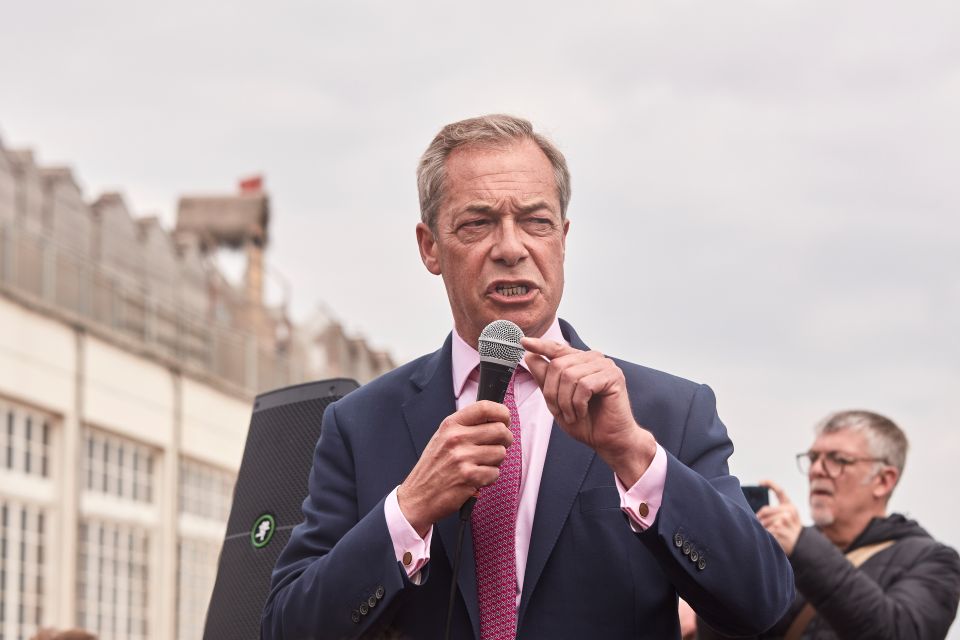Comment | 'Don't bet against Farage becoming PM'

By Gemma Loomes, lecturer in comparative politics at Keele University. This article first appeared as a Personally Speaking column in the Stoke Sentinel in May 2025.
The results of recent local elections, by-election and mayoral elections mark a potentially seismic shift in British politics. Although we should be wary of reading too much into what these results might mean for the next General Election, one thing is clear: Nigel Farage’s claim that Reform can form the next government, with Farage himself becoming Prime Minister, no longer seems fanciful.
Nationally, these election results indicate that the era of two-party dominance may be over. The broad national trend points towards a fragmentation of support on the left and right of the political spectrum; the 2024 General Election produced the highest vote share for third parties in UK electoral history, and recent elections have exacerbated this trend. Whereas the 2024 General Election was characterised by a lack of faith in the outgoing Conservative government, leading many on the centre-right to turn to Reform, disappointment with the current Labour government’s performance has seen voters on the centre-left turn to the Greens and Liberal Democrats, along with many also turning to Reform. Although the Liberal Democrats and Greens can be satisfied with their performance in the recent elections, the headlines belonged to Reform. Winning 677 council seats and taking control of ten councils, winning the by-election in Runcorn and Helsby and two mayoral elections, Reform has firmly put itself on the political map.
The Staffordshire County Council election results marked one of Reform’s most significant triumphs. Predicted to become the largest party but not to take overall control, Reform surpassed all expectations by taking 49 of the 62 seats on the council to comfortably seize control from the Conservatives. The headline figures are impressive but dig a little beneath the surface and the full significance of Reform’s victory becomes apparent, suggesting that the party’s success may mark the beginning of a sustained period of dominance in the local area. Not only did Reform secure 79 per cent of council seats, the party also received 41.2 per cent of the vote. In 2017, UKIP won just 6 per cent of the vote. In 2025, Reform claimed a clean sweep of all seven seats in Cannock Chase district, all five seats in the Tamworth district and all seven seats in the Staffordshire Moorlands district. In fifteen seats, the Reform candidate received over 50 per cent of the vote. In twelve of the thirteen seats Reform did not win, the party finished second. This election did not simply mark a victory for Reform; it was a crushing landslide.
So, what will a Reform-run Staffordshire County Council look like? What differences can we expect to see in the way in which our county is run? Since the results were declared, two main areas have already emerged where we expect to see Reform focus their efforts. Nigel Farage has vowed to deliver a new culture at the council, scaling back the council’s remit to core provision, ending working from home and promising savings in areas such as diversity and climate change policy. We have also heard the Reform party chairman Zia Yusuf pledge to ‘resist’ housing asylum seekers in Reform-controlled areas; with asylum seekers previously housed in hotels in Stafford, Cannock and Tamworth, expect to see this become a significant point of tension over the next few months as new Reform councillors across the county begin to settle into their roles.
Nigel Farage has big ambitions for himself, his party and for Staffordshire. What happens next matters not only at the local level but has significant national implications. Farage’s party has the opportunity to prove they are a competent and able governing party at the local level over the next few years. This is by no means guaranteed. Lacking previous experience of holding elected office, Reform councillors lack the years of expertise and knowledge that characterise more experienced politicians. But if they can prove themselves a success, the rewards are significant. If Reform can convince voters that they have done a good job locally, voters will be more confident giving their vote to Reform at the next General Election.
Support for the main two parties is plummeting. Party competition is fragmenting on both the left and the right of the political spectrum. Reform is now ahead in the national opinion polls, and the party’s narratives are seeping into Government policy, as we saw from the Prime Minister’s unveiling of the Government’s immigration policy on Monday.
Don’t bet against Nigel Farage completing a political hat-trick of leading his country out of the European Union, finally gaining a seat in Parliament and ultimately becoming Prime Minister.
Most read
- Keele-led partnership to lead multi-million pound research initiative to transform mental health support
- New debate series to explore societal challenges affecting universities
- Keele researchers selected for prestigious USA exchange programme
- Keele University launches pioneering green hydrogen generation hub
- Keele celebrates graduation of its first fully qualified paramedics
Contact us
Andy Cain,
Media Relations Manager
+44 1782 733857
Abby Swift,
Senior Communications Officer
+44 1782 734925
Adam Blakeman,
Press Officer
+44 7775 033274
Ashleigh Williams,
Senior Internal Communications Officer
Strategic Communications and Brand news@keele.ac.uk.



